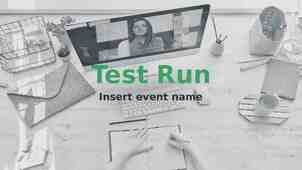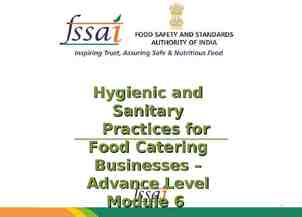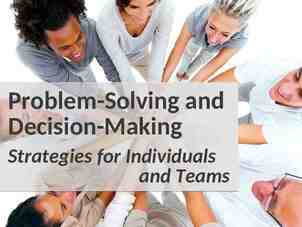Skills for Psychological Recovery (SPR) Week 7: SPR Skills Review,
40 Slides5.33 MB

Skills for Psychological Recovery (SPR) Week 7: SPR Skills Review, Tips, and Trainer Self-Care

Thank you from your SPR trainers Bill Maloney, MSW, LICSW, [email protected] Hanna Marzinske, MBA, [email protected] Janet Yeats, MA, LMFT, [email protected] Julie Johnson, BSW, [email protected] Kevynn Schumacher, MS, [email protected] Luke Campbell, MA, [email protected] Nancy Carlson, MPhil, CFT., CFE, [email protected] WWW.HEALTH.MN.GOV

Skills Review Week 1-6 3

SPR Core Actions 1. Information Gathering: obtains important information about needs and concerns 2. Problem Solving: increases self-mastery and enhances ability to reduce current stresses and problems 3. Managing Reactions: minimizes arousal and distress 4. Activity Scheduling: reduces stresses, increases social interaction, reduces depression 5. Helpful Thinking: reduces maladaptive appraisals 6. Rebuilding Healthy Social Connections: engages networks, activity levels, prevents depressive/withdrawal reactions 12/07/2022 health.state.mn.us 4

Potential Barriers to SPR Individual perceives contact as intrusive Has no Desire or Perceived Need for SPR: Not symptomatic initially and failing to see any need for services Having difficulty recognizing or articulating experiences Wanting to avoid discussing difficult experiences Tells you to “help my neighbors, they need it more than me ” Make sure the person needs SPR, AND has the energy and time to engage in SPR 12/07/2022 health.state.mn.us 5

Remember SPR is educational, similar to a training or coaching model Your relationship is foundational and crucial. It should be collaborative, encouraging, and non-judgmental Flexibility and “tiny steps” are emphasized Be flexible in: Timing Order of skills Use of handouts and worksheets Settings in which you use SPR Number of contacts 12/07/2022 health.state.mn.us 6

Always: Give a rationale for each SPR skill. Emphasize that multiple sessions will more likely yield higher skill building results. Follow all the steps in each SPR skill, especially if the skill sets don’t seem to be helping. If you choose to use the handouts and worksheets, introduce and them in a natural, conversational way. Remember that SPR is not meant to address the full range of issues- it is not therapy Refer people to more intensive treatment for more long-standing or debilitating symptoms/conditions. 12/07/2022 health.state.mn.us 7

Review SPR Skills 12/07/2022 health.state.mn.us 8

Gathering Information & Priority Setting Trauma Recovery Innovations University of Washington School of Medicine Department of Psychiatry and Behavioral Sciences 12/07/2022 health.state.mn.us 9

Problem Solving Trauma Recovery Innovations University of Washington School of Medicine Department of Psychiatry and Behavioral Sciences 12/07/2022 health.state.mn.us 10

Managing Reactions Trauma Recovery Innovations University of Washington School of Medicine Department of Psychiatry and Behavioral Sciences 12/07/2022 health.state.mn.us 11

Positive Activities Trauma Recovery Innovations University of Washington School of Medicine Department of Psychiatry and Behavioral Sciences 12/07/2022 health.state.mn.us 12

Promote Helpful Thinking Trauma Recovery Innovations University of Washington School of Medicine Department of Psychiatry and Behavioral Sciences 12/07/2022 health.state.mn.us 13

(Re)building Healthy Social Connections Trauma Recovery Innovations University of Washington School of Medicine Department of Psychiatry and Behavioral Sciences 12/07/2022 health.state.mn.us 14

SPR in One Contact How Can We Increase Motivation for More Than One Contact? 12/07/2022 health.state.mn.us 15

Increasing Motivation Provide a Rationale Motivation is increased when individuals understand the reasoning behind each SPR skill Provide the rationale for each SPR skill to help the individual understand the need for SPR. This Photo by Unknown Author is licensed under CC BY-NC-ND 12/07/2022 health.state.mn.us 16

Increasing Motivation Clarify Problem Areas with Empathy Motivation is increased by building trust and rapport with the individual. Clarify problem areas while expressing empathy: Understand the person’s feelings and perspective without judging, criticizing, or blaming Remember that it’s not necessary to agree, and that acceptance facilitates change Apply skillful reflective listening Remember that individual’s ambivalence is normal 12/07/2022 health.state.mn.us 17

Increasing Motivation Identify Discrepancies Motivation is increased when SPR skills align with personal goals. Ask about personal goals: “What are your most important personal goals for improving your situation, what do you want to see change?” Call out discrepancies: Look for some ways in which those goals conflict with his/her present behavior (i.e., payoff matrix). Give feedback that draws attention to the difference between present behavior and personal goals. 12/07/2022 health.state.mn.us 18

Increasing Motivation Support Self-Efficacy Elicit suggestions from the person for putting the SPR skill into practice by having him/her decide on the steps in the plan as much as possible. Use the worksheets to help them remember the plan. Try to come up with a version of the plan that he/she wants and feels that he/she can accomplish. Suggest a “trial run” of the action plan that they can practice for a short period of time. 12/07/2022 health.state.mn.us 19

Increasing Motivation Large Group Chat Exercise Mary is a 44-year-old nurse and mother of 2 primary school children with special healthcare needs. She lost her home and had to move out of the area due to the flooding. Her husband had to take work in another state when he lost his job due to the floods, so she and her children only see him once a month. Mary has had difficulty arranging childcare because her new daycare center is not always available during her work shifts. She complains of feeling depressed, tired, and frustrated and irritable, and reports that her children’s functioning in school, behavior, and moods have suffered as well. You are concerned that her depressed mood and lack of energy might interfere with her motivation to participate in SPR. Task: Name at least four actions you can you take to improve the likelihood that Mary can effectively engage in SPR in-session work and between-session homework assignments. 12/07/2022 health.state.mn.us 20

Increasing Motivation Scenario: Possible Solutions Mary defines the problem in her own terms(be person-centered) The rationale for PS and AS is discussed so that they make sense to Mary Mary helps generate alternatives (person-centered) Mary makes her own choice of solutions and/or activities (self-efficacy) Mary tries each solution / activity out for herself and sees the effects (Selfefficacy) You always check in with Mary (empathy and active listening) and ask: What do you think about what happened? What should be the next step? 12/07/2022 health.state.mn.us 21

3 Steps to Prevent Setbacks 1. Summarize the individuals work and growth on SPR skills. 2. Help the individual have realistic expectations for progress. 3. Identify “early warning signs” and make a plan to address these signs. 12/07/2022 health.state.mn.us 22

Step 1: Preventing Setbacks Summarize Progress Review and, if needed, revise goals. Review all the work that has been done in building/re-building SPR skills. Acknowledge and reinforce the learning and growth that has occurred no matter how slow or small. 12/07/2022 health.state.mn.us 23

Step 2: Preventing Setbacks Set Realistic expectations of Progress 12/07/2022 health.state.mn.us 24

Step 3: Preventing Setbacks Identify and Plan for “Early Warning Signs” (SPR Manual page 152) Sample Preventing Setbacks Action Plan Review what I did non SPR meetings and all my achievements. Remember that everyone has a bad day and that “My progress is NOT all blown.” Monitor my thoughts, feelings, and behaviors to find out if I’m having any early warning signs. Use the strategies I learned to problem solve, reframe unhealthy thoughts, and manage reactions to address the warning signs. If they don’t work right away, I’ll try again later. Ask someone to remind me or help me with the skills I’ve learned. If I do all the steps above for a reasonable amount of time and I’m not feeling better, I will seek support from friends or family or get further counseling with a mental health profession. 12/07/2022 health.state.mn.us 25

Recovering from Setbacks: Strategies & Tips for Moving Forward Shannon Sport 12/07/2022 health.state.mn.us 26

Example of Use of SPR in Multiple Contacts 12/07/2022 health.state.mn.us 27
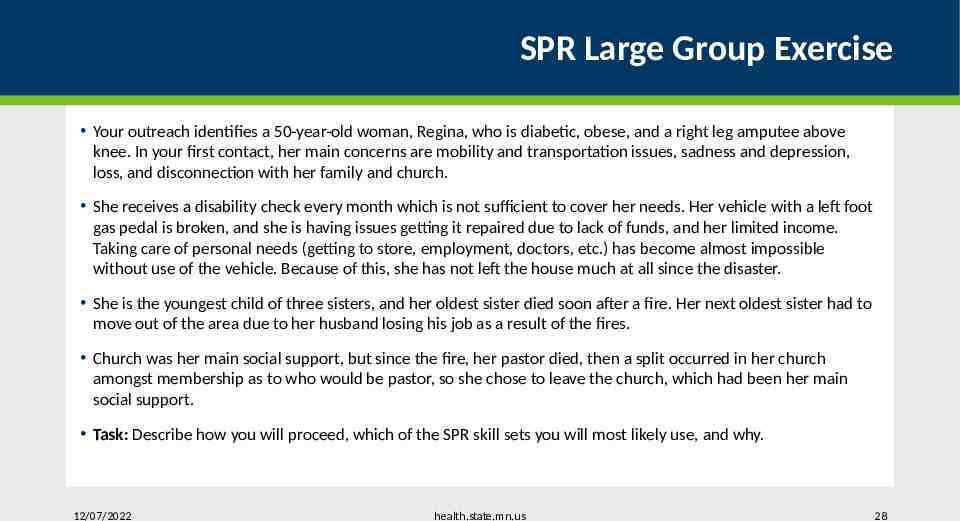
SPR Large Group Exercise Your outreach identifies a 50-year-old woman, Regina, who is diabetic, obese, and a right leg amputee above knee. In your first contact, her main concerns are mobility and transportation issues, sadness and depression, loss, and disconnection with her family and church. She receives a disability check every month which is not sufficient to cover her needs. Her vehicle with a left foot gas pedal is broken, and she is having issues getting it repaired due to lack of funds, and her limited income. Taking care of personal needs (getting to store, employment, doctors, etc.) has become almost impossible without use of the vehicle. Because of this, she has not left the house much at all since the disaster. She is the youngest child of three sisters, and her oldest sister died soon after a fire. Her next oldest sister had to move out of the area due to her husband losing his job as a result of the fires. Church was her main social support, but since the fire, her pastor died, then a split occurred in her church amongst membership as to who would be pastor, so she chose to leave the church, which had been her main social support. Task: Describe how you will proceed, which of the SPR skill sets you will most likely use, and why. 12/07/2022 health.state.mn.us 28

Group Exercise: The Plan 1. The SPR coaches drove Regina into a primary care physician to check her health. 2. They got her connected with grant resources to fix her van. 3. They asked her what she most liked to do, and she said looking for bargains, singing, and being around children. 4. They got her set up to get a license in daycare assistance and connected her with a daycare provider so she could be an assistant and read to the children and teach them to sing. 5. They suggested that she visit garage sales to gather materials for her daycare work, which she really enjoyed. 6. They discussed getting her connected with a church, but she preferred to take her time on that project and focus on her daycare work first. 7. They got her connected to a local singing group, and when she didn’t follow up on going, they used helpful thinking to help her identify her fears that the people wouldn’t like her, and substitute her fears with the thought, “I can try it with the help of one of the coaches, and if it isn’t for me, I can do something else.” She went to one meeting with an SPR coach, and the group embraced her, so she had a new group of potential friends. 12/07/2022 health.state.mn.us 29

Suggestions for Mastering SPR Integrate into your usual care role. Copy SPR materials and keep by your desk, or in easily accessible spot. Ask your SPR trainers if you need additional resources or on how to provide SPR in group settings. If there is a long time until your first training, use the SPR actions in your own life, or teach material to family members or a coworker or friend to keep it fresh in your memory. 12/07/2022 health.state.mn.us 30
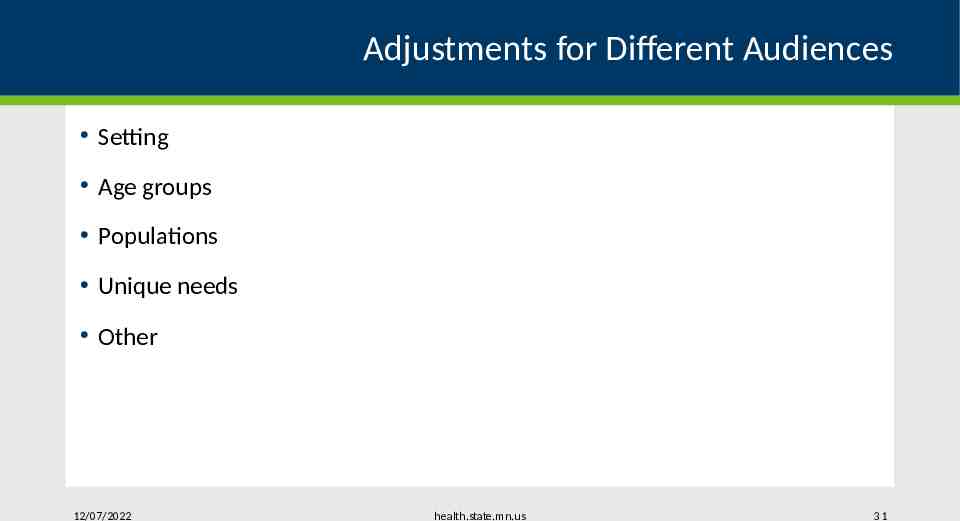
Adjustments for Different Audiences Setting Age groups Populations Unique needs Other 12/07/2022 health.state.mn.us 31
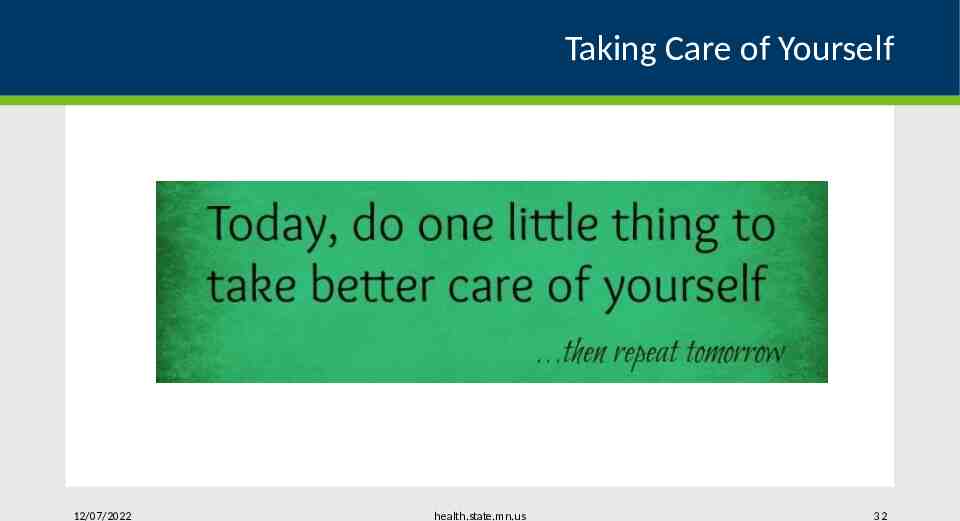
Taking Care of Yourself 12/07/2022 health.state.mn.us 32
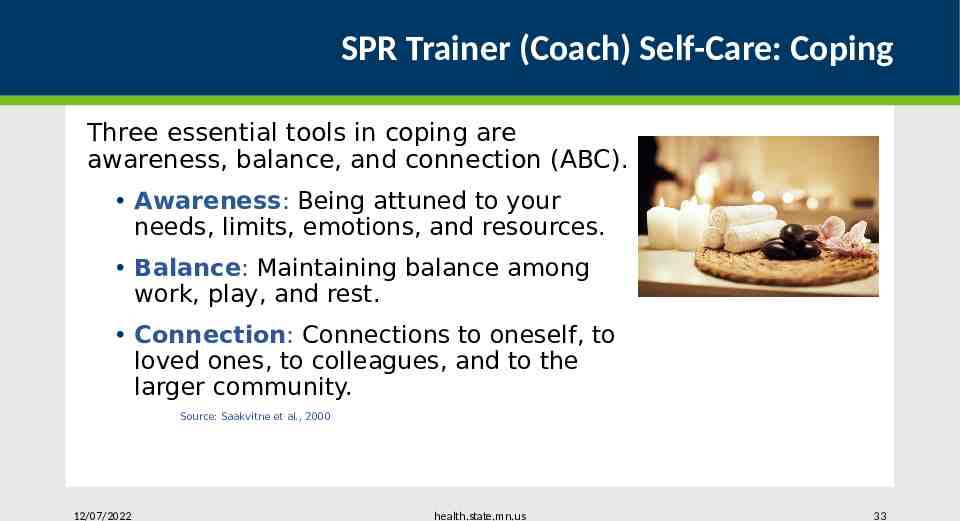
SPR Trainer (Coach) Self-Care: Coping Three essential tools in coping are awareness, balance, and connection (ABC). Awareness: Being attuned to your needs, limits, emotions, and resources. Balance: Maintaining balance among work, play, and rest. Connection: Connections to oneself, to loved ones, to colleagues, and to the larger community. Source: Saakvitne et al., 2000 12/07/2022 health.state.mn.us 33
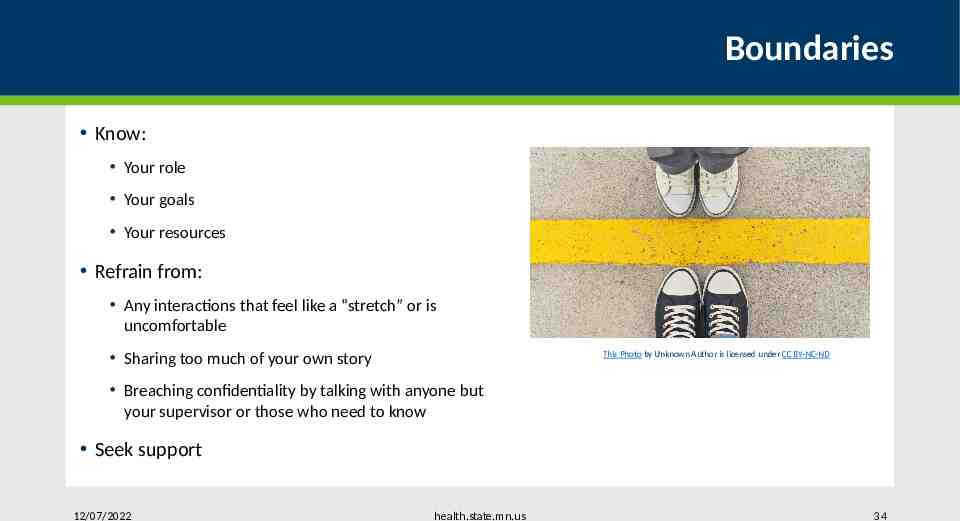
Boundaries Know: Your role Your goals Your resources Refrain from: Any interactions that feel like a “stretch” or is uncomfortable Sharing too much of your own story This Photo by Unknown Author is licensed under CC BY-NC-ND Breaching confidentiality by talking with anyone but your supervisor or those who need to know Seek support 12/07/2022 health.state.mn.us 34
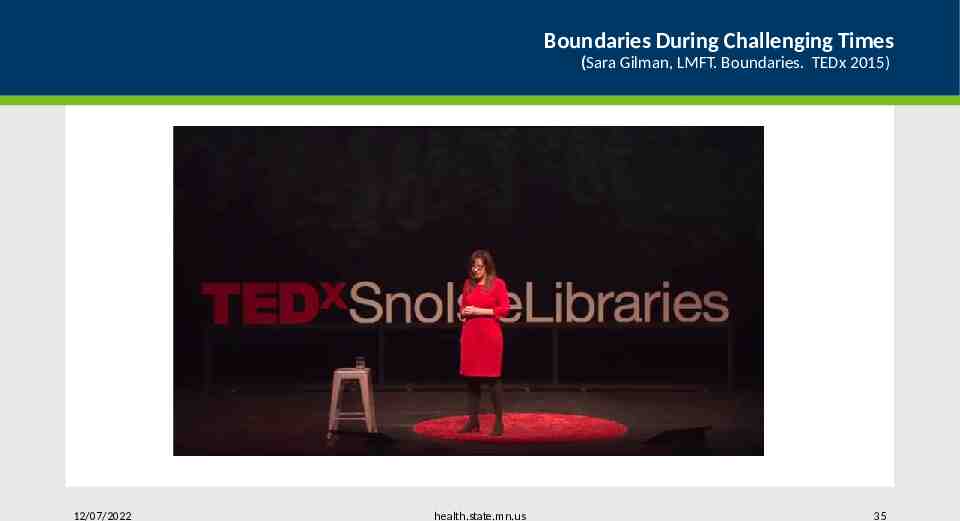
Boundaries During Challenging Times (Sara Gilman, LMFT. Boundaries. TEDx 2015) 12/07/2022 health.state.mn.us 35
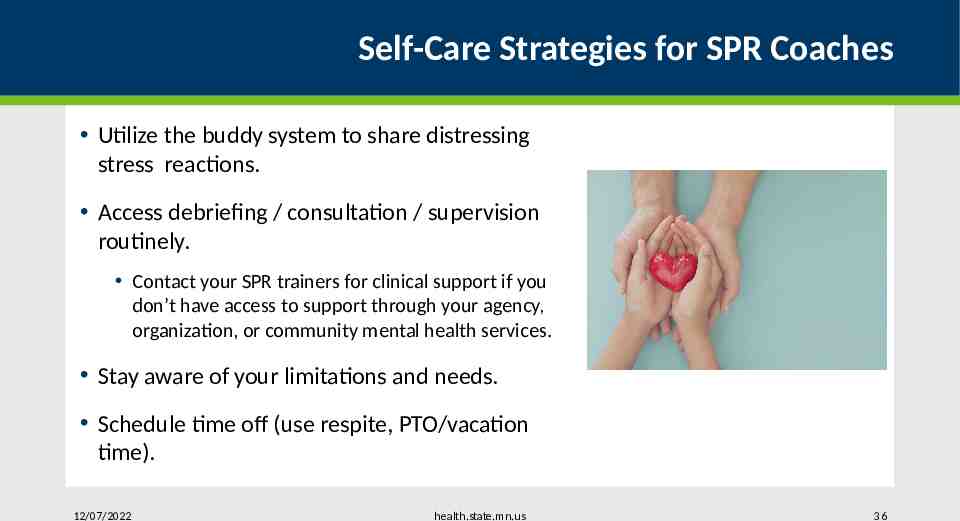
Self-Care Strategies for SPR Coaches Utilize the buddy system to share distressing stress reactions. Access debriefing / consultation / supervision routinely. Contact your SPR trainers for clinical support if you don’t have access to support through your agency, organization, or community mental health services. Stay aware of your limitations and needs. Schedule time off (use respite, PTO/vacation time). 12/07/2022 health.state.mn.us 36
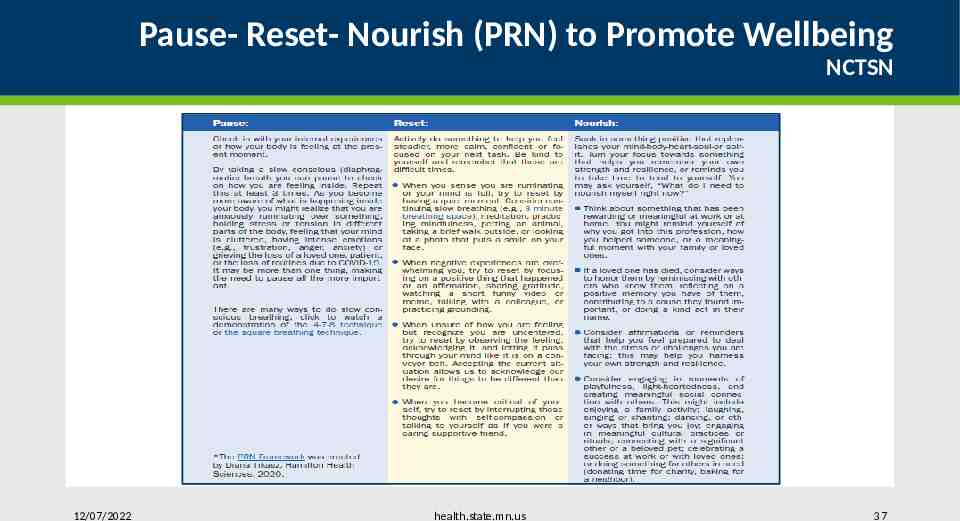
Pause- Reset- Nourish (PRN) to Promote Wellbeing NCTSN 12/07/2022 health.state.mn.us 37
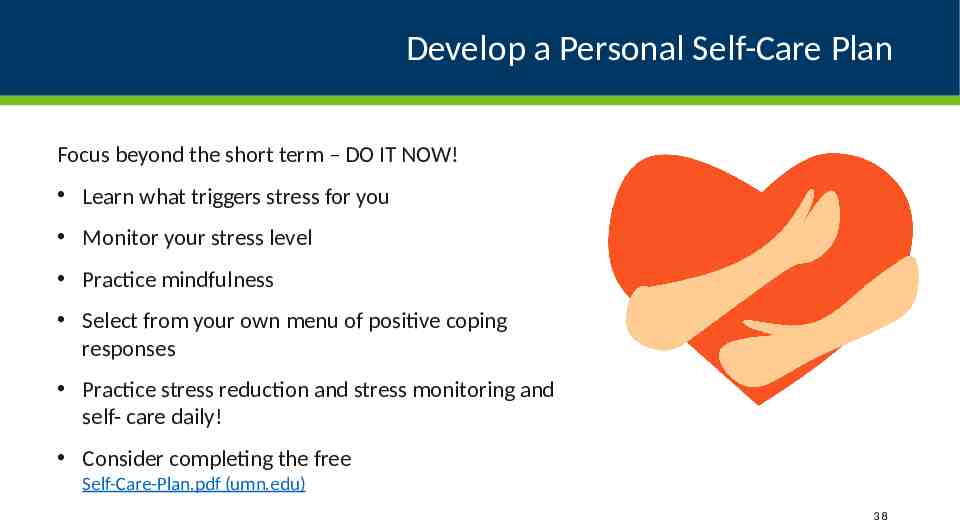
Develop a Personal Self-Care Plan Focus beyond the short term – DO IT NOW! Learn what triggers stress for you Monitor your stress level Practice mindfulness Select from your own menu of positive coping responses Practice stress reduction and stress monitoring and self- care daily! Consider completing the free Self-Care-Plan.pdf (umn.edu) 38
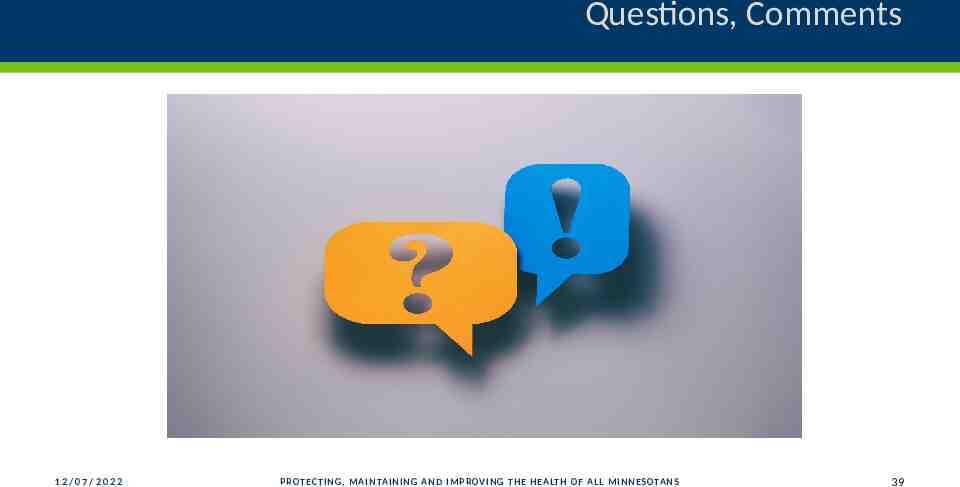
Questions, Comments 12/07/2022 PROT ECT ING, MA I NTA INING A ND IMP ROVING TH E H EA LTH OF A L L MINNESOTA NS 39
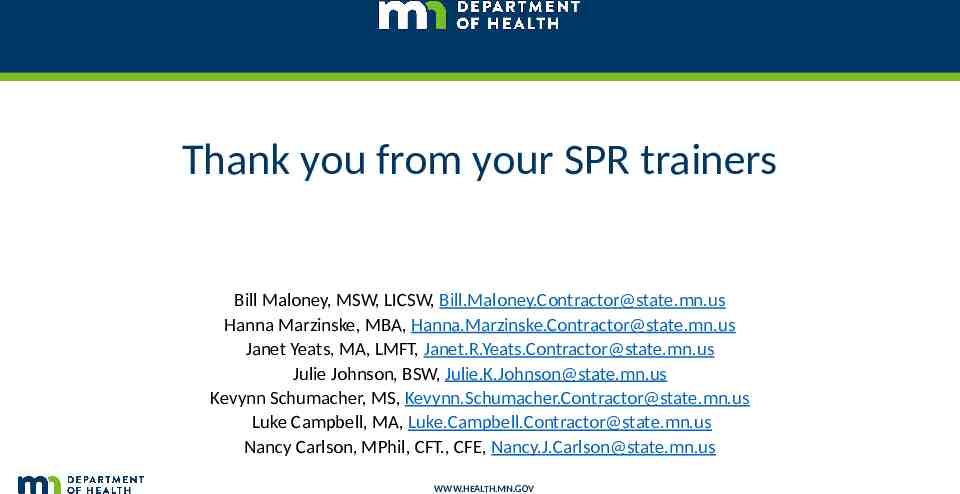
Thank you from your SPR trainers Bill Maloney, MSW, LICSW, [email protected] Hanna Marzinske, MBA, [email protected] Janet Yeats, MA, LMFT, [email protected] Julie Johnson, BSW, [email protected] Kevynn Schumacher, MS, [email protected] Luke Campbell, MA, [email protected] Nancy Carlson, MPhil, CFT., CFE, [email protected] WWW.HEALTH.MN.GOV



